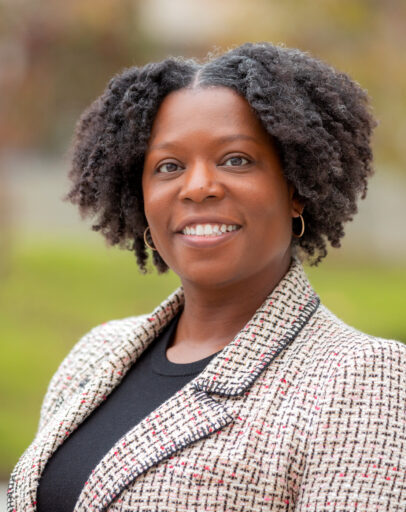When you’re compelled to serve the needs of your diverse customer base, what are the implications of that? Nationwide, Black people are more likely than white people to face illness, shorter life expectancies, and long-term health challenges, a gap which widens as social and economic inequalities worsen. This includes increased infant mortality rates, cancer deaths, and lack of access to healthcare. This was brought into starker focus during the COVID-19 pandemic, where Black and Hispanic people were dying in far higher numbers than white people.
“I think as healthcare providers, our focus on diversity, equity, and inclusion or lack thereof, can impact patients lives,” says Shannon Bradley, chief diversity and inclusion officer at Keck Medicine of USC (University of Southern California). Bradley has firsthand knowledge of how challenging the healthcare system can be. As a single Black mother in college, she was unable to make enough money to obtain health insurance despite working two part time jobs, but making just enough money to not qualify for state Medicaid. This experience led her to realize the importance of accessible healthcare.
In this exclusive interview with Senior Executive, Bradley discusses her new role as chief diversity and inclusion officer and the importance of health equity. She also talks about her success previously working for HCA Healthcare’s Gulf Coast division in Houston, Texas as assistant vice president and division director of diversity, equity and inclusion. Read the edited excerpt below.
Senior Executive DEI Think Tank is a criteria-based membership community for chief diversity officers and senior-level DEI leaders at large organizations to share difference-making tactics, trade valuable resources, and seek the counsel of experienced peers in a private, confidential setting.
Do you qualify?Senior Executive Media: What metrics are you going to use to measure your progress here at USC?
Shannon Bradley: I don’t know that we’ve settled on specific metrics just yet. I’m [fairly new] to the role and so we’re still developing the strategy and kind of where we want to focus on. What I can say is that there are pillars and key focus areas that we’ll focus on. From a workforce standpoint, we’ll look at what our representation looks like across all levels of the organization. We will also be looking at health equity [in terms of patient care] and how we can advance that whether it be through processes, outcomes, or a combination [of both]. I think continuing to look at how we can improve supplier diversity and what our role is in that space will be important. Then [we will be] really evaluating how we can be good community partners by making sure that we’re aware of what the community’s needs are, and that we’re also giving back and ensuring the health of the communities that we serve as well.
…When we’re looking at the DEI space, I also think it’s important for us to measure what we’re doing, because what we measure gets done. Having accountability, visibility, and transparency on the progress of our goals in DEI also offers opportunity for others to be able to get involved in the conversation [and] to be able to provide feedback because they know what’s going on. It also helps us to conversely hold us accountable if we’re not moving in the direction that we need to move in. I think that helps not only for us to make progress, but to also provide higher levels of engagement and accountability around the goals.
Senior Executive Media: What are you grateful for that the institution has put in place around you? What sort of resources, structure, and policies have been put in place to support you?
Shannon Bradley: I think that for our leadership team — even while I was interviewing for the job — it was evident that there was a lot of support. From an accountability standpoint, there are structures in place [such as] our executive steering committee and our employee resource groups that are already here. I think it’s a great start. There’s also the opportunity and the flexibility to continue to build in terms of the needs and the district’s strategic priorities that we’re going to have over the next year. The support and the excitement has been overwhelming and there’s a lot of great work already going on.
“You need resources to operationalize the things that you’re trying to do and to make sure that you’re being strategic with the tactics you use… Please don’t have your DEI leader working with no resources. They can work magic, but not necessarily miracles.”
Photo credit: Ricardo Carrasco III, Keck Medicine of USC
Senior Executive: What do you think is lacking that you would want more institutions to do proactively to support a new chief diversity officer?
Shannon Bradley: I think resources are extremely important, whether it’s budget or whether it’s staff. The buy-in of your leadership teams are critical for the success of a DEI leader. It’s collaborative, but it’s just like any other function within a business. You need resources to operationalize the things that you’re trying to do and to make sure that you’re being strategic with the tactics you use… Please don’t have your DEI leader working with no resources. They can work magic, but not necessarily miracles.
Senior Executive: Why is DEI so important in healthcare and where do you think diversity is lacking in American healthcare?
Shannon Bradley: Nationally, we’re becoming more and more diverse by the day. We’re currently extremely diverse as a nation. Some of our cities are more diverse than others, such as the L.A. metropolitan area where we’re located. We’ve got over 224 languages that are spoken here. The variety of cultures, ethnicities, races, socioeconomic statuses, and experiences all all impact how folks are able to access health care and then what they’re able to do once they’re actually in the healthcare system. I think as healthcare providers, our focus on diversity, equity, and inclusion or lack thereof, can impact patients lives. We have to be intentional in those efforts and make sure that we are moving toward providing the best patient experience and the best patient outcomes possible, and that is in some parts within our control.
Senior Executive: As far as DEI success stories that you’ve had throughout your career, what might those be?
Shannon Bradley: One of the things that I’m most proud of is an ability to achieve measurable improvements in maternal health outcomes. At HCA, I had an opportunity to work on… reducing C-sections for certain patient populations. Being able to focus on that from a data driven approach, we were able to see that the numbers improve over the span of a year. That can equate to patients having better lives, [a] better quality of life, and the communities that they serve being enriched as well. I’d also say implementation of our internal and external mentorship programs [was a success].
It was an extremely fulfilling and rewarding initiative not only internally for our colleagues, but being able to talk to students who may not have access to healthcare leaders in the way that we were able to provide access and information on the different possibilities that are available or conversations about what it’s like to be Black in healthcare right now. How often do they get to ask those types of questions? It was something that I’m very proud of, personally. It was [all] born out of feedback from my colleagues about things that they also wanted to pursue and where they wanted to have impact. I had the pleasure of working with them to implement some of those things.




